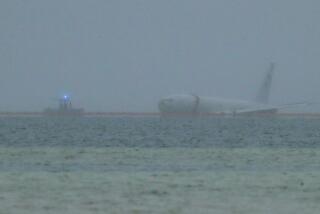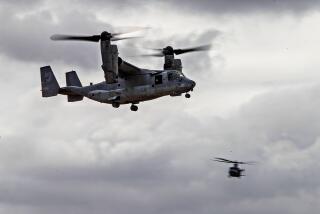Lockheed Sues the Navy Over Canceled Plane : Aerospace: The legal action seeks to keep the military from recovering $124 million until an appeal is resolved.
- Share via
Lockheed filed suit against the Navy on Tuesday, seeking to block the service from recovering $124 million in payments to the aerospace firm on the canceled P-7A patrol plane program.
The Navy only last week notified Lockheed that it wanted the Calabasas-based firm to repay the $124 million, turning down a request by the company that the government defer the payment until an appeal on the termination to the Armed Forces Board of Contract Appeals is resolved.
In unusually sharp and combative language, Lockheed said the suit was “alleging unfair treatment and violations of government procurement regulations.”
The Navy canceled the P-7A program last July under punitive terms known as default, in which it can seek to recover all payments made for products that were not delivered.
The suit, filed in U.S. District Court in Los Angeles, seeks an injunction that would prevent the Navy from collecting the $124 million. In its suit, Lockheed cites the Navy’s decision last month to permit McDonnell Douglas and General Dynamics to defer repaying $1.3 billion in connection with cancellation of the A-12 stealth fighter program.
“We have no quarrel with the government’s action in the A-12 case,” said Joseph Twomey, Lockheed’s general counsel. “But we believe the Navy’s denial of our deferment request is discriminatory and in conflict with Department of Defense procurement regulations and prior procurement practices.”
The Navy had planned to buy 125 of Lockheed’s P-7A anti-submarine aircraft, a derivative of its longstanding P-3 aircraft. The 125 planes would have been worth as much as $5 billion. The company, however, quickly overran an initial fixed-price development contract and took a $300-million writeoff in 1989.
That development contract also contained options that permitted the Navy to buy P-7As at prices that would have saddled Lockheed with hundreds of millions of dollars of losses.
Lockheed refused to build the aircraft at a loss and the Navy canceled the program under default, citing Lockheed’s “inability and/or unwillingness to meet other requirements in the contract.”
Lockheed had anticipated the P-7A would have a great deal of commonality with the P-3, but after signing the contract the firm realized that the P-3 airframe would require substantial modification to meet Navy performance requirements.
Twomey said Lockheed remains confident that it will win its appeal on the P-7A termination, which seeks to change the conditions of termination from default to convenience of the government. If it does win, it could recoup a substantial amount of the money it wrote off in the $300-million charge against profits.
More to Read
Inside the business of entertainment
The Wide Shot brings you news, analysis and insights on everything from streaming wars to production — and what it all means for the future.
You may occasionally receive promotional content from the Los Angeles Times.











